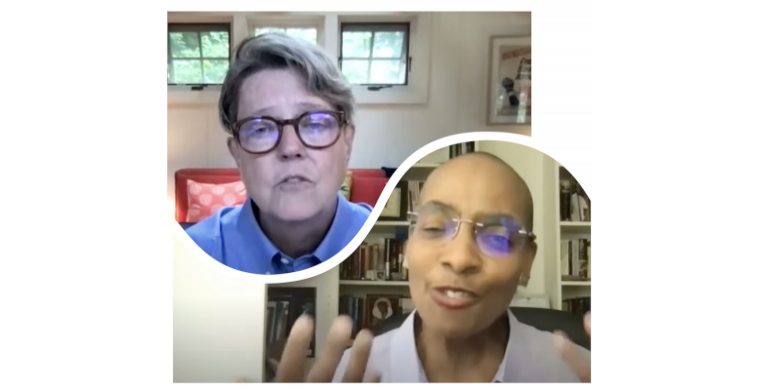Episcopal Seminary Dean Claims Religious Liberty 'Weaponized'
Giovanni Del Piero
https://juicyecumenism.com/
July 8, 2022
New York City's liberal Union Theological Seminary continues to espouse and promote heterodox views on Christian morals and ethics amidst fallout from the recent overturn of Roe v. Wade.
Union hosted a live interview between Episcopal Divinity School at Union Theological Seminary Dean Kelly Brown Douglas and Katherine Franke, the James L. Dohr Professor of Law at Columbia University and the Director of the Center for Gender and Sexuality Law. Douglas introduced Franke as a one of the nation's leading scholars writing on law related to sexuality, religion and race, adding that she draws "from feminist, queer, and critical race theory".
Franke described the recent Dobbs v. Jackson court decision overturning Roe as feeling like an "assault" and compared the reversal to the recent passing of her father.
"Even though as much as you prepare yourself for the loss of someone you love, you are still not prepared for it, it's still devastating, and that's how I felt with the death of Roe," Franke described. She lamented that her daughter would have fewer rights as a result of the decision and reduced status as a citizen in the United States.
Later, Douglas claimed that religious liberty is being "weaponized" by an "Evangelical, Christian nationalist" minority that she believes is in control of the public square and the dominant American political narrative. Franke also added to this that the court is in favor of not just Christian nationalism, but particularly "white Christian nationalists".
Douglas asked Franke how the Dobbs decision could be handed down despite citizenship protections guaranteed under the equal protection 14th and anti-slavery 13th amendments. Franke discussed efforts to revive the Equal Rights Amendment, which she claimed is supported by a Congressional majority. An addition of the words "sex equality" to the U.S. Constitution, would establish as "fundamental rights" access to various services such as abortion, Franke argued. The Columbia professor found to be "appalling" the Supreme Court majority view of abortion and "sex discrimination" as entirely separate issues, and called it a "horror" to have that mentality reaffirmed with Dobbs.
Douglas added that the decision paved a way for potential court reversals on issues related to "racial equality" and marriage issues. Franke concurred, claiming it was ironic that Associate Justice Clarence Thomas would potentially do away with laws related to interracial marriage and segregation because "he's married to a white woman".
Following this, Douglas enquired about the relationship between Dobbs and a "white supremacist agenda", adding that her thoughts when Roe was initially handed down went back to a speech by President Theodore Roosevelt emphasizing the duty of mothers to have children. Franke agreed and claimed that pregnancy was a "dangerous medical condition" for African American women, and referred back to a statute initially held by the state of Mississippi that mandated unmarried African American women be sterilized after having a second child. Franke added that though reproductive rights allowed for one's "liberty" to end a pregnancy, it also should be a freedom due to "reproductive justice" to have children as well. She then suggested that a potential end goal of the Supreme Court could be to put some of these laws back into effect, arguing that the court will use appeals of "tradition" to essentially turn the clock back on previously passed laws.
"Women's wombs are being criminalized," Douglas charged, claiming that a similar fate was befalling transgender people and children to make their own choices about certain medical treatments. Franke connects this back to the Supreme Court gun control case New York State Rifle & Pistol Association V. Bruen decided shortly before Dobbs, claiming it was a symptom of "white male vulnerability" to feel the need to walk around in public armed. Douglas believes that "transgender vulnerability" is not as visible to the Supreme Court as that of white males. The Episcopal seminary dean pointed to the recent Kennedy V. Bremerton case with a football coach praying on a public school field, claiming later on in the interview that the case would be different if it had a been Muslim or Sikh that had been praying instead. According to Franke, there is a "top tier of rights" according to the Supreme Court: those being religious liberty, gun, and property rights-followed by others on lower tiers.
Asked what the way is going forward, Franke argues that voting and local politicians are the best approach, claiming that this strategy was used by the political Right to gain power and that it should be replicated for Left-wing causes. She also claimed she was working with lawyers to push religious liberty lawsuits against restrictions on abortions, claiming that she could use the Right's religious liberty challenges against them in court.














